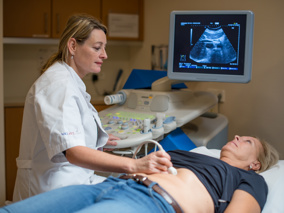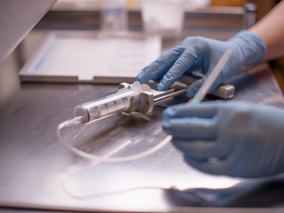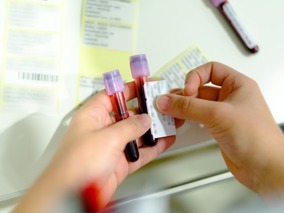Thyroid cancer
Thyroid cancer is a rare type of cancer that starts in the thyroid gland. The thyroid gland is located in the front of the neck, just below the Adam's apple.
In the Netherlands, about 700 people get a form of thyroid cancer every year. There are four main types of thyroid cancer: papillary, follicular, anaplastic and medullary. Papillary and follicular thyroid cancers (80-90% of all thyroid cancers) are very successful treatable.
On this page you can read more about our expertise, the symptoms, the most commonly used examinations, treatment options and the treatment team for thyroid cancer.
Learn more about thyroid cancer
Causes of thyroid cancer
The cause of thyroid cancer is not known. We do know what the risk factors are. For example, radiation to the neck, especially at a young age. In some people, thyroid cancer runs in the family. When treating thyroid cancer, we try to spare the organ as much as possible.
Symptoms of thyroid cancer
Symptoms and complaints in thyroid cancer are:
- A lump or swelling in the neck that moves when you swallow
- Hoarseness
- Difficulty swallowing
- You feel a growth in your neck, sometimes it hurts
Most people with thyroid cancer have no signs or symptoms.
Metastases of thyroid cancer
Fortunately, the chance that thyroid cancer will spread through the body is small. We call this metastatic thyroid cancer, or metastases. There are several treatments for metastatic thyroid cancer. Which treatment you receive depends on the location and size of the metastasis.
That is why the NKI:
-
Expertise
The NKI has a lot of expertise in the field of thyroid cancer and a dedicated multidisciplinary team.
-
Research and care
Research and care under one roof, so that you are always treated according to the latest insights, with the possibility of new treatments in a study context.
-
All treatment options
All possible treatment options are offered at the Netherlands Cancer Institute.
-
Cooperation
Intensive collaboration with UMC Utrecht (joint consultation and collaboration with the endocrinologists).
-
Supportive care
A lot of attention is paid to supportive care within our Center for Quality of Life, such as psychological help and dietetics.
-
Rapid diagnostics
In the NKI there is a special rapid diagnostics outpatient clinic, where we try to organize the diagnosis and treatment advice within 1 day. Your GP can refer you to this rapid diagnostics outpatient clinic.
Treatment team
The treatment team is composed of surgeons, internists (medical oncologists), nuclear medicine physicians and radiologists. Our specialists specialise in thyroid cancer and they have a weekly multidisciplinary meeting. This will discuss your situation on the basis of your results and medical data, and it will be determined which treatment is best for you. Your own doctor will then discuss the options with you. At the Netherlands Cancer Institute, you are an equal discussion partner and you help decide on your own treatment.
Surgeons
Internists
Nuclear medicine physicians
Radiologists
Radiation oncologists
Nurse specialists
Waiting
We want to inform you as well as possible about the waiting time per condition. We do this based on a prognosis of the current waiting list. The waiting time can vary from patient to patient for various reasons. Your attending physician will give you more information during your outpatient consultation.
-
26 days
First appointment
This is approximately how long it will take until you have your first appointment
-
12 days
First appointment
This is approximately how long it will take before you come in for a second opinion at the NKI
 nl
nl





